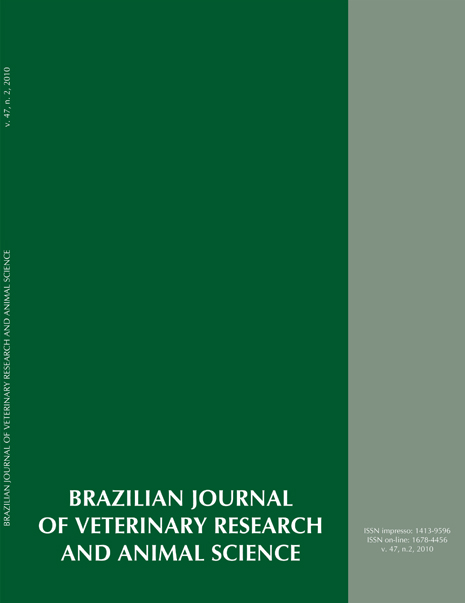Influence of refrigeration on blood gas analysis of caprine venous blood
DOI:
https://doi.org/10.11606/issn.1678-4456.bjvras.2010.26833Keywords:
Hemogasometria, Caprino, Sangue venosoAbstract
Blood samples collected from 14 healthy, four month-old, male goats of mixed breed, weighting from 30 to 45 kg, were analyzed in order to evaluate the effect of refrigeration on blood gas analysis. Blood samples to be used in the blood gas analysis were collected in duplicates, using disposable needles and plastic syringes containing around 1,000 IU of sodium heparin. Unpreserved samples were kept at room temperature, between 23 and 25 ºC, and those to be kept in refrigeration temperatures were placed in styrofoam coolers containing three liters of cold water and three kilograms of ice, in order to keep temperatures between zero and 4 ºC. Blood gas analyses were carried out immediately after collection and after 1, 2, 3, 4, 5, 6, 8, 10, 12 and 24 hours. Storage at room temperature affected significantly the group of variables studied, except blood concentration of HCO3. When samples were kept under refrigeration, partial pressure of O2, CO2 and SO2 were significantly affected. The significant variation in mean values of these variables when compared with initial mean values was greater in samples kept at room temperature. Results for pH, HCO3- and ABE in the refrigerated samples were stable for up to 24 hours of blood collection. It was concluded, therefore, that blood gas analysis of caprine venous blood may be safely carried out in up to six hours of blood collection, provided that samples are kept under adequate refrigeration.Downloads
Download data is not yet available.
Downloads
Published
2010-04-01
Issue
Section
UNDEFINIED
License
The journal content is authorized under the Creative Commons BY-NC-SA license (summary of the license: https://
How to Cite
1.
Leal ML do R, Soares PC, Cyrillo FC, Benesi FJ. Influence of refrigeration on blood gas analysis of caprine venous blood. Braz. J. Vet. Res. Anim. Sci. [Internet]. 2010 Apr. 1 [cited 2024 Apr. 16];47(2):105-10. Available from: https://www.revistas.usp.br/bjvras/article/view/26833





